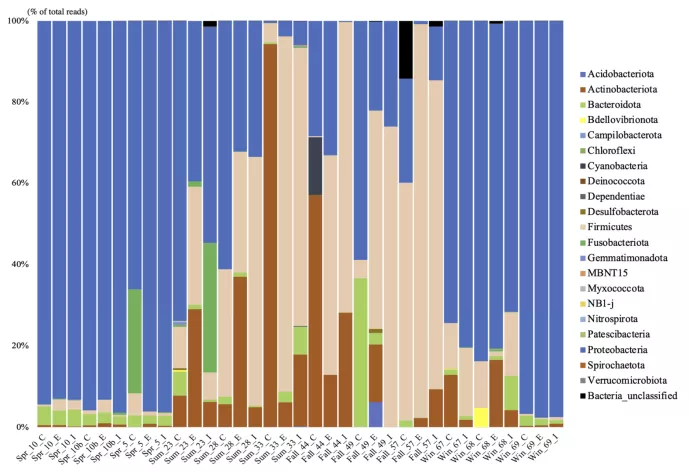
Tim Fernandes & Amy Dao on Seasons Influence the Native Got Microbiodome of Lake Trout
Congratulations go o Timothy Fernandes, PhD student & Amy Dao, MSc Student, McMeans Lab, on their paper Seasons Influence the Native Gut Microbiome of Lake Trout Salvelinus namaycush published by Applied Microbiology.
https://doi.org/10.3390/applmicrobiol3010019
The fish gut microbiome plays an essential role in the host's development and survival. Here, we analyzed the native gut microbiome of a flexible top predator fish species, the lake trout, across seasons in a boreal lake using 16S rRNA sequencing. Seasonality explained a large proportion of the bacterial variance, and the seasonal signals in community composition were strongly influenced by several bacterial taxa, including pathogenic Pseudomonas and Stenotrophomonas, and chemoheterotrophic Macrococcus and Lelliottia. We present novel evidence that suggests seasonality is likely to shape the native gut microbiome of lake trout; however, the mechanistic links between the environment and the microbial diversity of the gut remain to be uncovered.
Amy Dao:
I am currently pursuing an M.Sc. under the guidance of the McMeans lab. My research focuses on understanding the impact of seasonal changes, such as temperature, light, and prey accessibility on the gut size of freshwater fish. To answer this question, I am examining Lake Trout populations in two very different lakes: Lake of Two Rivers and Lake Opeongo. My goal is to shed light on these complex interactions between environmental factors and fish physiology, which can deepen our understanding of seasonal ecology. Outside of research, I enjoy sewing and reading.
Timothy Fernandes is a PhD candidate whose doctoral work focuses on bridging the gaps between fish ecology and physiology across biological and temporal scales. His project aims to identify and compare seasonal patterns in physiology and ecology across cold- and warm-water fish species, while also disentangling how changes to these patterns (as expected under a changing climate) may translate to divergent life history and productivity outcomes. Outside of research, he enjoys casting a line, swimming in cold lakes, and sleeping in small tents.
